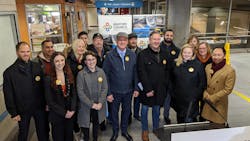Mayors’ Council stumps for Metro Vancouver transit
The Mayors’ Council on Regional Transportation, joined by community leaders and representatives of business, health, transportation and environment groups, called on the federal government to commit to the next phase of Metro Vancouver’s transit expansion plan.
The appeal comes as a delegation of mayors met with cabinet ministers, party leaders and MPs in Ottawa on Feb. 5. The mayors shared data on the record-breaking growth in transit ridership in Metro Vancouver, forecasts for increasing demand and specific requests for funding and policy development the government should consider for the upcoming 2020/2021 federal budget and subsequent budgets.
“Transit expansion has been a huge success story in Metro Vancouver, and it is clear that our communities want governments to continue investing in order to improve service,” said New Westminster Mayor Jonathan Cote, chair of the Mayors’ Council. “Our region is united in supporting the 10-Year Vision transit expansion plan because we all know what is at stake. If we want to grow our economy, tackle climate change, connect our regional business hubs and post-secondary institutions, and ensure better access to affordable housing, we need to expand our transit system.”
In a formal submission to the government of Canada ahead of the 2020/2021 federal budget, the Mayors’ Council outlines three areas requiring federal investment, which will help TransLink add more service in response to record-breaking ridership growth and reduce GHG emissions:
A Permanent Transit Fund – introduced in legislation in 2021 with funding starting in 2027 when current programs expire – providing approximately C$375 million (US$282.3 million) annually to TransLink to support future regional transit expansion.
Immediate transition funding to bridge the gap in advance of a Permanent Transit Fund. C$685 million (US$515.6 million) is required by mid-2021 as the federal share of Phase Three Plan of the 10-Year Vision, which includes extending SkyTrain from Fleetwood to Langley, a proposed gondola connecting rapid transit to the SFU campus on Burnaby Mountain, adding service on existing rapid transit lines and adding more bus and rapid-bus service region-wide.
Funding of C$225 million (US$169.4 million) to accelerate conversion of TransLink’s bus fleet to emissions-free battery electric technology starting in 2021.
“The Mayors’ Council appreciates the government’s commitment to long-term approaches to funding and emissions reduction, but the fact is we can’t wait seven years to move forward with the next phase of transit expansion in Metro Vancouver, otherwise we will face severe overcrowding on our system and worsening congestion on our roads,” said Langley Mayor Jack Froese, vice-chair of the Mayors’ Council.
Recent data shows ridership on Metro Vancouver’s transit system is growing more quickly than anticipated. With an estimated 20 percent increase between 2016 and 2019, TransLink ridership is far outpacing other transit systems in Canada and across North America.
Metro Vancouver is also unique among Canada’s major metropolitan regions in having allocated all but a fraction of the infrastructure funding already provided by the federal government, with the next phase of projects already identified and a supportive provincial government committed to providing a 40 percent share of capital costs.
“With more people across our region choosing to take transit, and with seniors, young people, workers and families relying on our system, we can’t afford to delay completion of the 10-Year Vision,” said Vancouver Mayor Kennedy Stewart. “Renewing our partnership with the federal and provincial governments will also help us move more quickly on the next wave of critical projects, including SkyTrain service improvements and extensions, more bus and rapid bus and the Burnaby Mountain gondola.”
The group of organizations supporting the Mayors’ Council in calling on federal and provincial governments to continue investing in regional transit includes: Better Transit and Transportation Coalition, University of British Columbia, Simon Fraser University, BC Chamber of Commerce, Greater Vancouver Board of Trade, North Van Chamber, Urban Development Institute, David Suzuki Foundation, Immigration Services Society of BC, BC Healthy Living Alliance, United Way of the Lower Mainland and Fraser Valley, Alliance of British Columbia Students, BC Federation of Students, UBC Alma Mater Society, Simon Fraser Students’ Society, Emily Carr Students’ Union, Students’ Union of VCC, Douglas Students’ Union and HUB Cycling.
